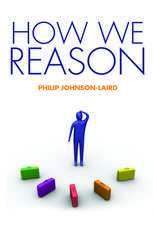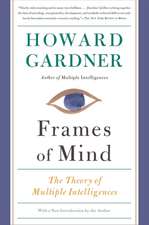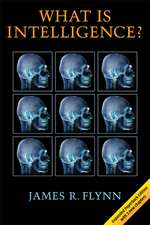Handbook of Understanding and Measuring Intelligence
Editat de Oliver Wilhelm, Randall W. Engleen Limba Engleză Hardback – 10 noi 2004
Preț: 1089.05 lei
Preț vechi: 1491.85 lei
-27% Nou
Puncte Express: 1634
Preț estimativ în valută:
208.40€ • 222.84$ • 173.75£
208.40€ • 222.84$ • 173.75£
Carte tipărită la comandă
Livrare economică 17 aprilie-01 mai
Preluare comenzi: 021 569.72.76
Specificații
ISBN-13: 9780761928874
ISBN-10: 0761928871
Pagini: 552
Dimensiuni: 178 x 254 x 35 mm
Greutate: 1.13 kg
Ediția:First Edition
Editura: SAGE Publications
Colecția Sage Publications, Inc
Locul publicării:Thousand Oaks, United States
ISBN-10: 0761928871
Pagini: 552
Dimensiuni: 178 x 254 x 35 mm
Greutate: 1.13 kg
Ediția:First Edition
Editura: SAGE Publications
Colecția Sage Publications, Inc
Locul publicării:Thousand Oaks, United States
Recenzii
"This volume provides an in-depth yet accessible and up-to-date review of the key topics pertinent to current intelligence research. This state-of-the-art summary about our theoretical understanding of human abilities and their measurement is of interest for researchers, practitioners, and advanced students in psychology, education, and related disciplines. It's a great summary and a good read on a truly important topic."
"Wilhelm and Engle have compiled a highly informative set of chapters on various topics related to intelligence. The chapters describing recent European work will be especially informative for North American readers. The work is strengthened by provision of review chapters that keep the reader in sight of the forest rather than the trees."
"...it is extremely useful and contemporary, covering among its five hundred pages, genetics, neuro-imaging and emotional intelligence. It also provides a good indicator of current psychological work in the area with empirical evidence and theory sitting alongside each other. The material on meta-cognition would, I suspect, be of most interest to philosophers, along with the more basic questions concerning the nature of memory and intelligence."
—PRACTICAL PHILOSOPHY
"Wilhelm and Engle have compiled a highly informative set of chapters on various topics related to intelligence. The chapters describing recent European work will be especially informative for North American readers. The work is strengthened by provision of review chapters that keep the reader in sight of the forest rather than the trees."
"...it is extremely useful and contemporary, covering among its five hundred pages, genetics, neuro-imaging and emotional intelligence. It also provides a good indicator of current psychological work in the area with empirical evidence and theory sitting alongside each other. The material on meta-cognition would, I suspect, be of most interest to philosophers, along with the more basic questions concerning the nature of memory and intelligence."
—PRACTICAL PHILOSOPHY
Cuprins
Preface
Introduction (Intelligence: A Diva and a Work Horse) - O. Wilhelm, & R. W. Engle
Assessing Problem Solving in Context - P. C. Kyllonen, & S. Lee
Mental Speed: On Frameworks, Paradigms, and a Platform for the Future - V. Danthiir, R. D. Roberts, R. Schulze, & O. Wilhelm
Cognitive Mechanisms Underlying Intelligence: Defense of a Reductionist Approach - A. R. A. Conway
Working Memory Capacity, Attention Control, and Fluid Intelligence - R. P. Heitz, N. Unsworth, & R. W. Engle
Emotional Intelligence: An Elusive Ability - G. Matthews, M. Zeidner, & R. D. Roberts
Metacognition and Intelligence - C. Hertzog, & A. E. Robinson
Knowledge and Intelligence - P. L. Ackerman, & M. E. Beier
Full Frontal Fluidity? Looking in on the Neuroimaging of Reasoning and Intelligence - M. J. Kane
Behavioral Genetics and Intelligence - S. A. Petrill
A Dialectical Constructivist View of Developmental Intelligence - J. Pascual-Leone, & J. Johnson
Development of Intellectual Abilities in Old Age: From Age Gradients to Individuals - M. Lövdén, & U. Lindenberger
Group Differences in Intelligence and Related Measures - W. W. Wittmann
Modeling Structures of Intelligence - R. Schulze
Item Response Theory and the Measurement of Cognitive Processes - F. Schmiedek
g Factor: Issues of Design and Interpretation - L. Stankov
Capturing Successful Intelligence Through Measures of Analytic, Creative, and Practical Skills - P. J. Henry, R. J. Sternberg, & E. L. Grigorenko
Faceted Models of Intelligence - H.-M. Süß & A. Beauducel
Assessing Intelligence: Past, Present, and Future - R. D. Roberts, P. M. Markham, M. Zeidner, & G. Matthews
The Role of Domain Knowledge in Higher-Level Cognition - D. Z. Hambrick
Measuring Reasoning Ability - O. Wilhelm
The Measurement of Working Memory Capacity - K. Oberauer
Working Memory, Intelligence, and Learning Disabilities - H. L. Swanson
Cognitive Ability in Selection Decisions - D. S. Ones, C. Viswesvaran, & S. Dilchert
Understanding Intelligence: A Summary and an Adjustable-Attention Hypothesis - N. Cowan
To g or not to g - That Is the Question - N. Brody
Introduction (Intelligence: A Diva and a Work Horse) - O. Wilhelm, & R. W. Engle
Assessing Problem Solving in Context - P. C. Kyllonen, & S. Lee
Mental Speed: On Frameworks, Paradigms, and a Platform for the Future - V. Danthiir, R. D. Roberts, R. Schulze, & O. Wilhelm
Cognitive Mechanisms Underlying Intelligence: Defense of a Reductionist Approach - A. R. A. Conway
Working Memory Capacity, Attention Control, and Fluid Intelligence - R. P. Heitz, N. Unsworth, & R. W. Engle
Emotional Intelligence: An Elusive Ability - G. Matthews, M. Zeidner, & R. D. Roberts
Metacognition and Intelligence - C. Hertzog, & A. E. Robinson
Knowledge and Intelligence - P. L. Ackerman, & M. E. Beier
Full Frontal Fluidity? Looking in on the Neuroimaging of Reasoning and Intelligence - M. J. Kane
Behavioral Genetics and Intelligence - S. A. Petrill
A Dialectical Constructivist View of Developmental Intelligence - J. Pascual-Leone, & J. Johnson
Development of Intellectual Abilities in Old Age: From Age Gradients to Individuals - M. Lövdén, & U. Lindenberger
Group Differences in Intelligence and Related Measures - W. W. Wittmann
Modeling Structures of Intelligence - R. Schulze
Item Response Theory and the Measurement of Cognitive Processes - F. Schmiedek
g Factor: Issues of Design and Interpretation - L. Stankov
Capturing Successful Intelligence Through Measures of Analytic, Creative, and Practical Skills - P. J. Henry, R. J. Sternberg, & E. L. Grigorenko
Faceted Models of Intelligence - H.-M. Süß & A. Beauducel
Assessing Intelligence: Past, Present, and Future - R. D. Roberts, P. M. Markham, M. Zeidner, & G. Matthews
The Role of Domain Knowledge in Higher-Level Cognition - D. Z. Hambrick
Measuring Reasoning Ability - O. Wilhelm
The Measurement of Working Memory Capacity - K. Oberauer
Working Memory, Intelligence, and Learning Disabilities - H. L. Swanson
Cognitive Ability in Selection Decisions - D. S. Ones, C. Viswesvaran, & S. Dilchert
Understanding Intelligence: A Summary and an Adjustable-Attention Hypothesis - N. Cowan
To g or not to g - That Is the Question - N. Brody
Descriere
The Handbook of Understanding and Measuring Intelligence provides an overview of recent studies on intelligence to help readers develop a sound understanding of results and perspectives in intelligence research. In this volume, editors Oliver Wilhelm and Randall W. Engle bring together a group of respected experts from two fields of intelligence research, cognition and methods, to summarize, review, and evaluate research in their areas of expertise. The chapters in this book present state-of-the-art examinations of a particular domain of intelligence research and highlight important methodological considerations, theoretical claims, and pervasive problems in the field.

















